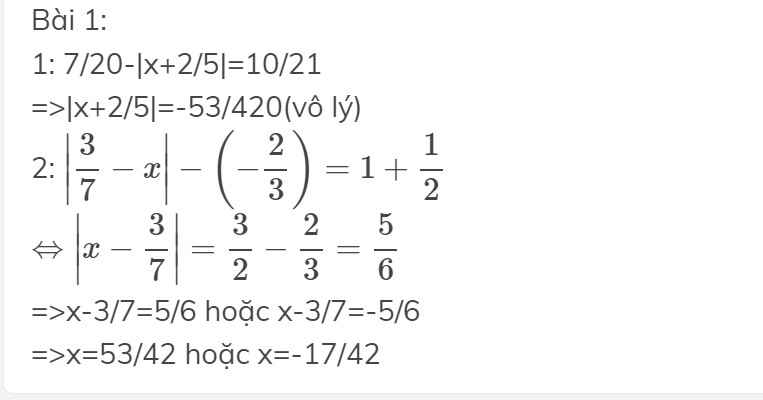
Hãy nhập câu hỏi của bạn vào đây, nếu là tài khoản VIP, bạn sẽ được ưu tiên trả lời.


Bài 1
1.(x-3)(x+2)-x(x-7)=15
\(\Leftrightarrow x^2+2x-3x-6-x^2+7x=15\)
\(\Leftrightarrow-6+6x=15\)
\(\Leftrightarrow6x=15+6\) =21
\(\Rightarrow x=\dfrac{21}{6}=3,5\)
2.(x-5)(x+5)+x(3-x)=20
\(\Leftrightarrow x^2-25+3x-x^2=20\)
\(\Leftrightarrow-25+3x=20\)
\(\Leftrightarrow3x=20+25=45\)
\(\Rightarrow x=\dfrac{45}{3}=15\)
3.(x-7)2-x(2+x)=-7
\(\Leftrightarrow x^2-14x+49-2x-x^2=-7\)
\(\Leftrightarrow-16x+49=-7\)
\(\Leftrightarrow-16x=-7-49=-56\)
\(\Rightarrow x=\dfrac{-56}{-16}=\dfrac{7}{2}=3,5\)
Tiếp bài 1
4.(x-4)2-(x+4)(x-4)=-16
\(\Leftrightarrow x^2-8x+16-x^2-16=-16\)
\(\Leftrightarrow-8x=-16\)
\(\Rightarrow x=\dfrac{-16}{-8}=2\)
5.(x-5)(x+5)-x(2-3x)=4x2-7
\(\Leftrightarrow x^2-25-2x+3x^2=4x^2-7\)
\(\Leftrightarrow4x^2-25-2x+3x^2=4x^2-7\)
\(\Leftrightarrow4x^2-4x^2-2x=-7+25\)
\(\Leftrightarrow-2x=18\)
\(\Rightarrow x=\dfrac{18}{-2}=-9\)

\(\left(x+4\right)\left(x^2-4x+16\right)-x\left(x-4\right)^2=8\left(x-3\right)\left(x+3\right)\)3)
\(\Leftrightarrow x^3+4^3-x\left(x-4\right)^2=8\left(x^2-3^2\right)\)
\(\Leftrightarrow x^3+64-x\left(x^2-8x+16\right)=8x^2-72\)
\(\Leftrightarrow x^3+64-x^3+8x^2-16x-8x^2-72=0\)
\(\Leftrightarrow-16x-8=0\)
\(\Leftrightarrow-8\left(2x-1\right)=0 \)
\(\Rightarrow2x-1=0\)
\(\Leftrightarrow2x=1\)
\(\Leftrightarrow x=\frac{1}{2}\)
Vậy \(x=\frac{1}{2}\)

một đòn bẫy dài một mét .đặt ở đâu để có thể dùng 3600n có thể nâng tảng đá nặng 120kg?

a: \(\dfrac{1}{x-2}+3=\dfrac{3-x}{x-2}\)
=>1+3x-6=3-x
=>3x-5=3-x
=>4x=8
hay x=2(loại)
b: \(\Leftrightarrow8-x-8\left(x-7\right)=-26\)
=>8-x-8x+56=-26
=>-9x+64=-26
=>-9x=-90
hay x=10(nhận)
c: \(\dfrac{1}{x-2}+\dfrac{1}{x-3}=\dfrac{2}{x-1}\)
\(\Leftrightarrow\dfrac{x-3+x-2}{\left(x-2\right)\left(x-3\right)}=\dfrac{2}{x-1}\)
\(\Leftrightarrow\left(x-1\right)\left(2x-5\right)=2\left(x^2-5x+6\right)\)
\(\Leftrightarrow2x^2-5x-2x+5=2x^2-10x+12\)
=>-7x+10x=12-5
=>3x=7
hay x=7/3(nhận)


3: \(-\dfrac{1}{2}+\left|\dfrac{1}{3}x+\dfrac{2}{5}\right|=\dfrac{5}{7}\cdot\dfrac{3}{11}+\dfrac{8}{11}\cdot\dfrac{5}{7}=\dfrac{5}{7}\)
=>|1/3x+2/5|=5/7+1/2=17/14
=>1/3x+2/5=17/14 hoặc 1/3x+2/5=-17/14
=>x=171/70 hoặc x=-339/70

P/S : Câu 2,3 kết quả bằng bao nhiêu mới tìm được x ?
1.\(\left(2x-7\right)^2-4\left(x-3\right)=5\)
=> \(\left(2x\right)^2-2\cdot2x\cdot7+7^2-4x+12=5\)
=> \(4x^2-28x+49-4x+12=5\)
=> \(4x^2-32x+61=5\)
=> \(4x^2-32x+61-5=0\)
=> \(4x^2-32x+56=0\)
=> \(4\left(x^2-8x+14\right)=0\)
=> \(x^2-8x+14=0\)
=> \(\orbr{\begin{cases}x=4-\sqrt{2}\\x=\sqrt{2}+4\end{cases}}\)
4.\(\left(3x-1\right)^2-6\left(x-1\right)\left(x+1\right)-3x\left(x-2\right)=7\)
=> \(\left(3x\right)^2-2\cdot3x\cdot1+1^2-6\left(x^2-1\right)-3x^2+6x=7\)
=> \(9x^2-6x+1-6x^2+6-3x^2+6x=7\)
=> \(\left(9x^2-6x^2-3x^2\right)+\left(-6x+6x\right)+\left(1+6\right)=7\)
=> 7 = 7(đúng)
5. \(\left(x+3\right)^2-\left(x-4\right)\left(x+8\right)=1\)
=> \(x^2+2\cdot x\cdot3+3^2-x\left(x+8\right)+4\left(x+8\right)=1\)
=> x2 + 6x + 9 - x2 - 8x + 4x + 32 = 1
=> (x2 - x2) + (6x - 8x + 4x) + (9 + 32) = 1
=> 2x + 41 = 1
=> 2x = -40
=> x = -20

Ko chép lại đề!
\(\Leftrightarrow x^2-7^2+x^2-2=2x^2+10\)
\(\Leftrightarrow x^2-49+x^2-2=2x^2+10\)
\(\Leftrightarrow2x^2-51=2x^2+10\)
<=> -51 = 10 ( vô lý )
=> \(x\in\varnothing\)
\(\left(x+7\right)\left(x-7\right)+x^2-2=2\left(x^2+5\right)\)
\(\Leftrightarrow x^2-49+x^2-2=2x^2+10\)
\(\Leftrightarrow x^2+x^2-2x^2=10+2+49\)
\(\Leftrightarrow0x=61\)(vô nghiệm)
\(\Leftrightarrow x\in\varnothing\)